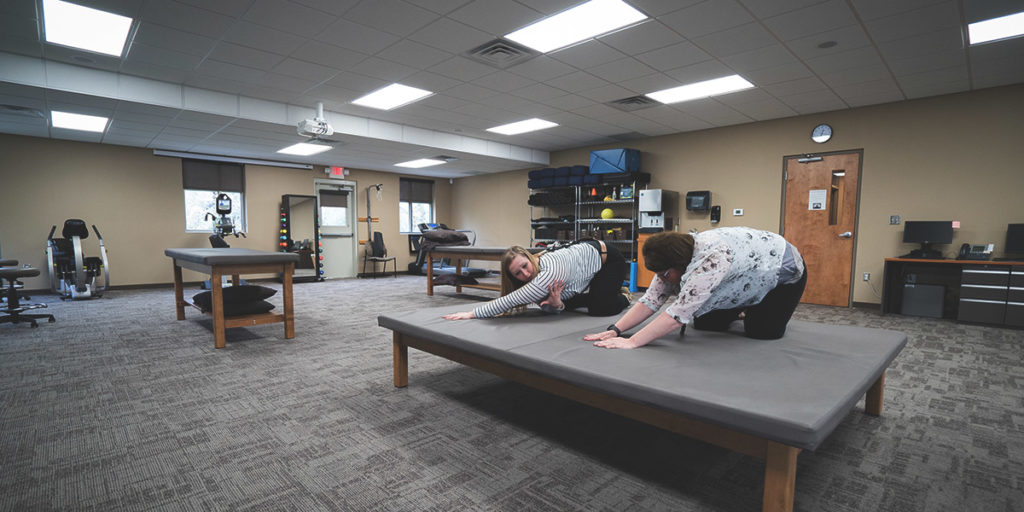
When Stefanie Urbom meets with patients for the first time she oftentimes uses her own story as part of the introduction.
“My mom had cancer…” she says, honestly, explaining her mom’s surgery, recovery and the number of years she’s been cancer-free.
She does this because a lot of her patients are skeptical and nervous about opening up. They look at Stefanie and think, ‘What could this young, healthy girl know about helping someone like me…’
Their skepticism is valid, Stefanie said, but what her patients often don’t understand is that Stefanie has interacted with cancer in a way that shifted both her personal and professional life forever.
As a kid, Stefanie said she was always helping people. Whether it was kids at school who needed a little extra attention, or a friend with a problem, she liked to be an advocate for the underdog. Which is why it seemed like a no-brainer for her to pursue a career in the medical field.
She graduated from Nebraska Wesleyan and then attended physical therapy school at the University of Nebraska Medical Center. It was while she was going through school that her mom was diagnosed with breast cancer.
“I was devastated,” she said. “I was very scared of the big C word – you just think the worst.”
Stefanie felt paralyzed and limited by her options to help her mom. Sure, she could provide emotional support, but at times that didn’t seem like enough. She watched as her mom lost her hair after chemotherapy, as she struggled with short term memory loss, fatigue and the emotional and physical pain and that followed her mastectomy.
Her mom wasn’t herself, she didn’t feel like herself and that was the hardest part for Stefanie to watch. But the one thing Stefanie could do was research how to help her mom deal with the physical repercussions of treatment and surgery. She quickly realized that her mom could benefit from physical therapy during her recovery.
After graduating from physical therapy school, Stefanie continued to study the use of physical therapy for cancer recovery and also became a certified lymphedema therapist. She realized that while people are often unaware of the benefits physical therapy can have for a patient undergoing treatment for cancer, helping these patients regain their strength, maintain activity level and manage pain are crucial parts of their care.”
Currently about half of the patients she sees have cancer. Stefanie works with them to reduce pain and improve their quality of life.
It’s a heavy job, because not all of her patients make it through their therapy programs, but Stefanie said she doesn’t think about it that way. She goes in to each day thinking about what she can give her patients, independent of how many days they have left. She makes it her mission to help her patients laugh during therapy, to talk about something other than cancer and to help them feel like themselves again.
Stefanie said she tries not to let the sad stories distract her from the reason she does her work, but it’s still difficult. She has hard days and can get overwhelmed by sadness when she sees something that reminds her of a patient who has died.
In the same way that cancer has defined the story of so many of her patients, being a physical therapist who works closely with cancer patients has shaped Stefanie in ways she hadn’t anticipated.
It’s made her a professional who craves knowledge so that she can provide the best care possible and it’s made her a wife and mother who is grateful for her family’s health.
But she’s also realized cancer, even her mom’s battle with cancer, isn’t the only thing that defines her story.
Stefanie is a young mom and wife who tries to balance working full-time and being attentive to her young children and husband. She’s ambitious and outgoing, she loves to have fun but also enjoys the simple things in life.
Her story is about using her own experience to help others. It’s about learning how to lean in to moments that others often shy away from, and seeing people beyond their current circumstances.
It’s also been about stepping back and watching how other stories have impacted her own story, learning from those moments and choosing to keep moving forward.
Her story has been shaped by some hard circumstances, but it’s also a story that she’s still trying to understand herself. She’s trying to figure out what’s next, how to continue to grow personally and professionally and how to piece all of these elements together.
“It’s a process,” she said, one that builds over time, one patient at a time, one day at a time and one moment at a time.